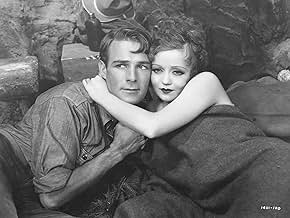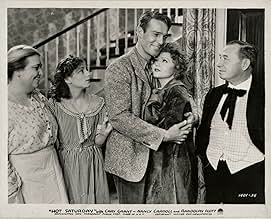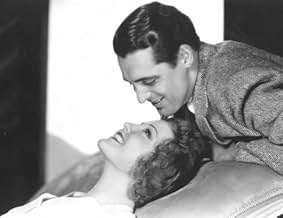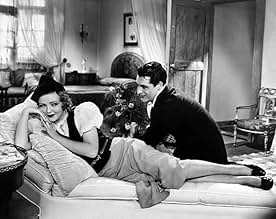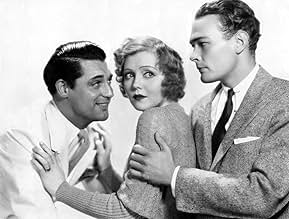IMDb RATING
6.5/10
1.5K
YOUR RATING
A pretty but virtuous small-town bank clerk is the victim of a vicious rumor from an unsuccessful suitor that she spent the night with a notorious womanizer.A pretty but virtuous small-town bank clerk is the victim of a vicious rumor from an unsuccessful suitor that she spent the night with a notorious womanizer.A pretty but virtuous small-town bank clerk is the victim of a vicious rumor from an unsuccessful suitor that she spent the night with a notorious womanizer.
Lilian Bond
- Eva Randolph
- (as Lillian Bond)
Nora Cecil
- Gossip on Telephone
- (uncredited)
Billy Engle
- Third Bank Customer
- (uncredited)
Kenner G. Kemp
- Party Guest
- (uncredited)
Marjorie Main
- Gossip in Window
- (uncredited)
Dave O'Brien
- Party Guest
- (uncredited)
Featured reviews
In small-town Marysville, attractive bank clerk Nancy Carroll (as Ruth Brock) is desired by several young men. She prefers to play the field. One of Ms. Carroll's more ardent admirers is wealthy playboy Cary Grant (as Romer Sheffield). He invites Ms. Carroll and her friends over to his lakeside estate for alcohol and fun, on a "Hot Saturday" night in July. Carroll arrives, on a date with co-worker Edward Woods (as Connie Billop). She refuses to make-out with him during a boat ride, so he dumps her ashore. That's not very gentlemanly. Carroll walks to Mr. Grant's house and he sends her home in his chauffeured car. Jealous banker's daughter Lilian Bond (as Eva Randolph) sees Carroll sneaking in late and spreads the rumor that Carroll spent the night with Grant. Carroll's reputation is ruined...
Soon, girl-shy geologist Randolph Scott (William "Bill" Fadden) returns to town, after seven years. A childhood friend, Mr. Scott discovers Carroll has grown out of her pigtails and into a bra. Carroll sees quick marriage as a solution to her problems. "Hot Saturday" is about malicious gossip, which has turned out to be a timeless problem. It's interesting to see it play out in the 1930s. Director William Seiter and the Paramount studio crew really go to town on "Marysville". The automobiles and fashions gleam. There are almost too many people in early background scenes; probably, everyone ran errands on Saturday. Watch for a scene occurring at just under 15 minutes of running time; in it, Carroll wrestles her squealing teenage sister Rose Coughlan (as Annie) to remove some stolen under-shorts.
****** Hot Saturday (10/28/32) William Seiter ~ Nancy Carroll, Cary Grant, Randolph Scott, Edward Woods
Soon, girl-shy geologist Randolph Scott (William "Bill" Fadden) returns to town, after seven years. A childhood friend, Mr. Scott discovers Carroll has grown out of her pigtails and into a bra. Carroll sees quick marriage as a solution to her problems. "Hot Saturday" is about malicious gossip, which has turned out to be a timeless problem. It's interesting to see it play out in the 1930s. Director William Seiter and the Paramount studio crew really go to town on "Marysville". The automobiles and fashions gleam. There are almost too many people in early background scenes; probably, everyone ran errands on Saturday. Watch for a scene occurring at just under 15 minutes of running time; in it, Carroll wrestles her squealing teenage sister Rose Coughlan (as Annie) to remove some stolen under-shorts.
****** Hot Saturday (10/28/32) William Seiter ~ Nancy Carroll, Cary Grant, Randolph Scott, Edward Woods
Aside from the silly and gratuitous underwear scene, this movie does a good job of telling the story of poor Ruth Brock, a hard-working, put-upon small town girl who is judged and persecuted by her neighbors and so-called friends following a day of fun on an eponymous 'Hot Saturday' in the summer of 1932.
Subsequent events show how much women had staked on maintaining their reputations at that time, a topic that didn't go away with the enforcement of the production code though it lost a lot of its nuance. The expression on Ruth's face in the last frame of this film is so uncertain...she doesn't know if she's doing the right thing, doesn't know quite what she's getting into. I grieve for the loss of that ambiguity in films made in the years to come.
Nancy Carroll is brilliant in the role of Ruth, sparing the audience tedious hysterics and instead portraying the bitterness and frustration of living in a town of petty fools with nothing better to do than tear each other apart. I sort of wish there were two versions of this movie, one starring Carroll and one starring Barbara Stanwyck so I could do a side-by-side comparison. Stanwyck did such a good job with offended righteousness in 'Night Nurse'. But I'd keep Cary Grant in both...young and perfectly cast in the role of the local "disreputable cad" (that's how he's described (aptly) on the label).
But even a disreputable cad can have good points...and keen-eyed, truthful, pre-production code Ruth won't fail to notice them...
Subsequent events show how much women had staked on maintaining their reputations at that time, a topic that didn't go away with the enforcement of the production code though it lost a lot of its nuance. The expression on Ruth's face in the last frame of this film is so uncertain...she doesn't know if she's doing the right thing, doesn't know quite what she's getting into. I grieve for the loss of that ambiguity in films made in the years to come.
Nancy Carroll is brilliant in the role of Ruth, sparing the audience tedious hysterics and instead portraying the bitterness and frustration of living in a town of petty fools with nothing better to do than tear each other apart. I sort of wish there were two versions of this movie, one starring Carroll and one starring Barbara Stanwyck so I could do a side-by-side comparison. Stanwyck did such a good job with offended righteousness in 'Night Nurse'. But I'd keep Cary Grant in both...young and perfectly cast in the role of the local "disreputable cad" (that's how he's described (aptly) on the label).
But even a disreputable cad can have good points...and keen-eyed, truthful, pre-production code Ruth won't fail to notice them...
Newcomer Cary Grant was paired with Paramount star Nancy Carroll in Hot Saturday, a film which is most dated, but still packs quite a punch. Nancy Carroll's stardom was beginning to slip while Cary as we know was fast on the rise.
Hot Saturday however is about gossip, something that will eternally be with us. But happy to say some people's attitudes have definitely changed for the better. Nancy Carroll would not be fired today from her job at a bank because of her private life.
Carroll's a popular girl with all the young men of her town, but she's engaged to stalwart Randolph Scott who's a promising young engineer. One of her fellow co-workers at the bank Edward Wood tries to put the moves on her, but she won't give him a tumble. It's he who starts a nasty rumor about Carroll and the town playboy Cary Grant who is guilty of nothing more than offering her a ride home in his car after she ran off from Woods.
Depending on where you are from malicious gossip will probably not have the effect it does on Nancy Carroll. Still it can damage one. Years ago in a former place of work and we're talking now about the 1970s I recall in my office there was a section known as the 'poison pond'. It was where a few women who had nothing else to do but gossip about everything and everyone else around. No escaped their malicious tongues and something like what happens to Nancy Carroll would have been grist for that mill for a month.
Thank God people have a more live and let live attitude, but gossip is still a perennial problem and Hot Saturday deals nicely with it.
Hot Saturday however is about gossip, something that will eternally be with us. But happy to say some people's attitudes have definitely changed for the better. Nancy Carroll would not be fired today from her job at a bank because of her private life.
Carroll's a popular girl with all the young men of her town, but she's engaged to stalwart Randolph Scott who's a promising young engineer. One of her fellow co-workers at the bank Edward Wood tries to put the moves on her, but she won't give him a tumble. It's he who starts a nasty rumor about Carroll and the town playboy Cary Grant who is guilty of nothing more than offering her a ride home in his car after she ran off from Woods.
Depending on where you are from malicious gossip will probably not have the effect it does on Nancy Carroll. Still it can damage one. Years ago in a former place of work and we're talking now about the 1970s I recall in my office there was a section known as the 'poison pond'. It was where a few women who had nothing else to do but gossip about everything and everyone else around. No escaped their malicious tongues and something like what happens to Nancy Carroll would have been grist for that mill for a month.
Thank God people have a more live and let live attitude, but gossip is still a perennial problem and Hot Saturday deals nicely with it.
Small town 'nice' girl (Nancy Carroll) becomes victim of rumors that she spent the night with wealthy playboy (Cary Grant). Because of this she loses her job and her boyfriend (Randolph Scott). Decent Pre-Coder with some risqué subject matter. Love the funny scene where Nancy Carroll wrestles her younger sister and removes her underwear. Carroll is cute and has good chemistry with Grant. Cary's very charming even this early in his career. Scott's fine, too. Jane Darwell plays Carroll's shrewish mother. Nice production and small town atmosphere. I saw this on TCM and the print is exceptionally good for a movie this old.
Hot Saturday (1932)
There are a few early Cary Grant movies where he has a small role, or where he isn't quite the "Cary Grant" we have come to expect (and which he always jokingly said he wanted to become himself). But this one is pure, true Grant, and very early, indeed. But even better, the plot, the mise-en-scene (including town scenes, domestic situations, and a range of outdoor stuff at the lake including a bohemian roadhouse on the water), and the photography are amazing. I mean amazing. There are a few stumbles in the acting, but you get so swept along, and so continually surprised, this won't matter much at all.
The director of all this gets a huge amount of credit, because William Seiter who pulls the best out of the cast and the crew, equally--and who presumably helped choose some terrific location shots as well as matching studio scenes. Seiter was a Hollywood working man director, doing lesser A-list films and making them decent, though none that I've seen (a small fraction of a huge output from the 20s to the 40s) has the energy and flair of this one. And this is an unsung one, definitely worth seeking out.
Likewise, Arthur Todd behind the camera did a dumpload of good if unamazing films, and so it was with the music and set design. But the leading lady is another story. Nancy Carroll really steals the show, even from Grant and the other leading male, the rather wooden and handsome Randolph Scott. She has a kind of live-wire, doll-face quality a little similar to Claudette Colbert, easily as amazing in this film. Carroll supposedly had more fan mail than any actress in this era of Hollywood, and was contracted with Paramount (which was the studio here). But she was so difficult to work with offscreen (rejecting many parts) they let her go, and her career slid, and she probably missed out on another higher kind of stardom.
But here she is alive, sympathetic, and complex on screen. If Cary Grant isn't enough to lure you in, give Carroll her due.
This is of course a pre-code film (widely advertised as such) and in fact the looseness of the events, the morality of the lead, and the suggestive scenes (never explicit) all help make this come alive. The dance and party scenes are so much fun you'll wish you were there, and the cave in the storm as well as the night scenes in the woods are pretty amazing, too. The end will prove, again, both the ability of pre-code films to touch on real life issues, and the need of even these kinds of films to have a moral compass by the end. The very last few seconds takes care of this.
Great stuff. A huge surprise for me.
There are a few early Cary Grant movies where he has a small role, or where he isn't quite the "Cary Grant" we have come to expect (and which he always jokingly said he wanted to become himself). But this one is pure, true Grant, and very early, indeed. But even better, the plot, the mise-en-scene (including town scenes, domestic situations, and a range of outdoor stuff at the lake including a bohemian roadhouse on the water), and the photography are amazing. I mean amazing. There are a few stumbles in the acting, but you get so swept along, and so continually surprised, this won't matter much at all.
The director of all this gets a huge amount of credit, because William Seiter who pulls the best out of the cast and the crew, equally--and who presumably helped choose some terrific location shots as well as matching studio scenes. Seiter was a Hollywood working man director, doing lesser A-list films and making them decent, though none that I've seen (a small fraction of a huge output from the 20s to the 40s) has the energy and flair of this one. And this is an unsung one, definitely worth seeking out.
Likewise, Arthur Todd behind the camera did a dumpload of good if unamazing films, and so it was with the music and set design. But the leading lady is another story. Nancy Carroll really steals the show, even from Grant and the other leading male, the rather wooden and handsome Randolph Scott. She has a kind of live-wire, doll-face quality a little similar to Claudette Colbert, easily as amazing in this film. Carroll supposedly had more fan mail than any actress in this era of Hollywood, and was contracted with Paramount (which was the studio here). But she was so difficult to work with offscreen (rejecting many parts) they let her go, and her career slid, and she probably missed out on another higher kind of stardom.
But here she is alive, sympathetic, and complex on screen. If Cary Grant isn't enough to lure you in, give Carroll her due.
This is of course a pre-code film (widely advertised as such) and in fact the looseness of the events, the morality of the lead, and the suggestive scenes (never explicit) all help make this come alive. The dance and party scenes are so much fun you'll wish you were there, and the cave in the storm as well as the night scenes in the woods are pretty amazing, too. The end will prove, again, both the ability of pre-code films to touch on real life issues, and the need of even these kinds of films to have a moral compass by the end. The very last few seconds takes care of this.
Great stuff. A huge surprise for me.
Did you know
- TriviaThis was Cary Grant's first role as a leading man.
- GoofsWhen Conny Billop signs his name in Ruth's date planner, he spells it "Connie", but in the credits the character's name is listed as Conny.
- Quotes
Ruth Brock: Is Listerine good for brains?
Romer Sheffield: Love they tell me is better.
- Crazy credits(Opening titles) Marysville boasted of one bank, two fire engines, four street cars, and a busy telephone exchange. Everyone knew on Sunday what everyone else did on Saturday... and the rest of the week.
- ConnectionsFeatured in L'univers du rire (1982)
- SoundtracksIsn't It Romantic?
(uncredited)
Written by Richard Rodgers and Lorenz Hart
Heard on soundtrack when Carroll arrives at Grant's house.
- How long is Hot Saturday?Powered by Alexa
Details
- Runtime1 hour 13 minutes
- Color
- Aspect ratio
- 1.37 : 1
Contribute to this page
Suggest an edit or add missing content


